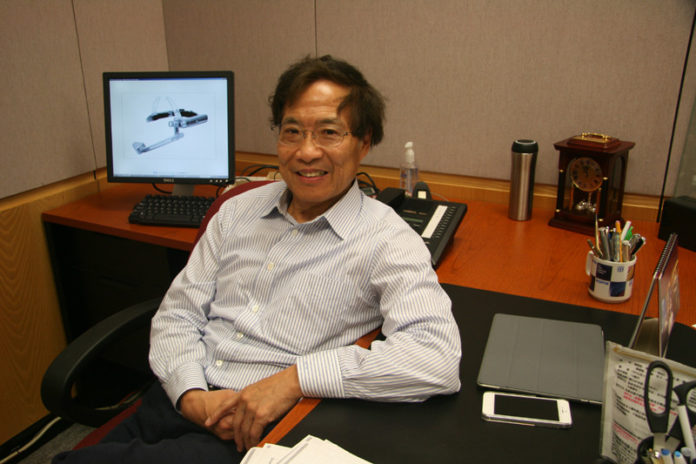
The pressure is always on for businesses to adapt to become successful, but in the technology industry, where innovation thrives, companies must work extra hard to find a focus that works both technologically and economically.
That can mean shifting focus, sometimes more than once, to find the right niche in constantly changing markets.
Swipely Founder Angus Davis’ company has done so three times since its 2009 inception. The Providence-based company was founded as a product-review site through which customers could share shopping histories. It then transitioned to a customer-loyalty program that would let merchants analyze customer purchases and – most recently and successfully – to a platform that helps merchants accept payments and understand customers.
Swipely’s latest iteration has garnered the attention of investors. The company raised $12 million in a series B funding round in May and, according to Elizabeth Ducoff, a senior manager in public relations and marketing, is so “laser-focused” on its future that it did not want to discuss past endeavors.
“I think it’s true in life, but it’s almost certainly true in new ventures – everything that you’ve planned out has to change,” said M. Cary Collins, a finance professor at Bryant University. Collins added that most likely, the drive to change in the business world is coming from either clients or competitors.
“You listen and you change. Sometimes you find that the revenue model isn’t there. There’s just no one there to pay for what you’re proposing,” said Collins. “Still, if you know you’ve got good technology … if you’ve got a good team that works well together, then it’s really incumbent on you to keep the team together and keep the technology and go find the problem that really needs your coding skills and is worth conceiving.”
This is exactly what GreenBytes Inc. did when it started to shift its focus last spring. GreenBytes, founded in 2007, originally offered only data-reduction and data-deduplication technology as a way to reduce the amount of disc space required for companies to store backups.
“We had some competition and the competition outcompeted us in the marketplace,” said CEO Stephen O’Donnell. “They had more money, and they were just able to do sales executions better than we were. … So what we decided to do was to spin the business around, to actually turn our back on the market we’d been addressing in the past and focus on a brand new market.”
GreenBytes started the switch in May 2012, and by the end of the year they had “pretty much completely turned around the company,” according to O’Donnell, who said that in the first two quarter of 2012, the “products have really started to come in. The customers have really started to recognize that we’ve got something unique and different and appreciate it.”
In the last 12 months, the company – which O’Donnell joined as CEO midtransition in November – has taken in $20 million in investments and nearly doubled the number of employees.
“We’ve been getting a huge amount of recognition. Getting awards in the marketplace for technology and just being generally recognized as being the go-to company to solve virtual-desktop problems,” a market that, according to O’Donnell, was very poorly represented.
Although pivots often take place during the founding years of a company, that is certainly not always the case. Twenty-seven-year-old Kopin Corp., the largest LCD manufacturer in the United States, is currently undergoing a major transition from a successful operating company back to an innovation company, as it focuses almost completely on the wearable technology market.
In January, Kopin announced an agreement with U.K.-based IQE PLC to sell all assets relating to its III-V heterojunction bipolar transistors for $75 million. The transistors that the company pioneered in the 1990s help power nearly every wireless phone on the planet, according to Kopin Founder and President John C. C. Fan.
“Every year, 400 million phones depend on our transistors made it Taunton. People don’t quite understand that,” said Fan. Still, this successful operating division is what his company sold to IQE in the beginning of the year to continue the latest in a long line of transformations.
Since its 1985 spin-out from the Massachusetts Institute of Technology, Fan said his company undergoes a serious transformation every five to 10 years. “Technology goes through disruptive changes quite often, and nowadays it’s happening more and more often. If a company doesn’t change in technology, then often they become obsolete,” said Fan.
Kopin has started focusing on the nascent wearable computing market. The company plans to create and provide component products – both software and hardware – to any company that wants to build wearable computer devices. While the company will provide concept models for people to adopt and license from them, it won’t provide devices to the retail market – putting the company in a different position than Google with its Google Glass device.
“It’s innovation again,” said Fan. “We’re the biggest LCD manufacturer and the biggest transistor manufacturer with wireless phones. We can do that, but now we say: ‘OK, let’s create something else again.’”
“You wear a different hat every five, six, seven years,” said Fan. “But we’re all energized. It’s rolling up your sleeves saying, ‘This time, we’re going to create a new thing again.’ You know, we did it before and made our company worth a lot of money. Later on, the product gets commoditized, so we try to make new stuff again.”
The willingness of the team to transition the company is a really important component to a successful pivot, according to Collins. “It’s very tough,” he said. “Change requires that you have to communicate to an existing team that’s been rolling in one direction that it will stop and turn, and you have to say: ‘We’re going to have to roll twice as hard and three times as fast.’ That’s a hard sell.”
Still, if it’s pivot or perish, “You give it a try. You listen to your customers, you let them tell you what they like and don’t like. They’re the buyers,” said Collins. •












